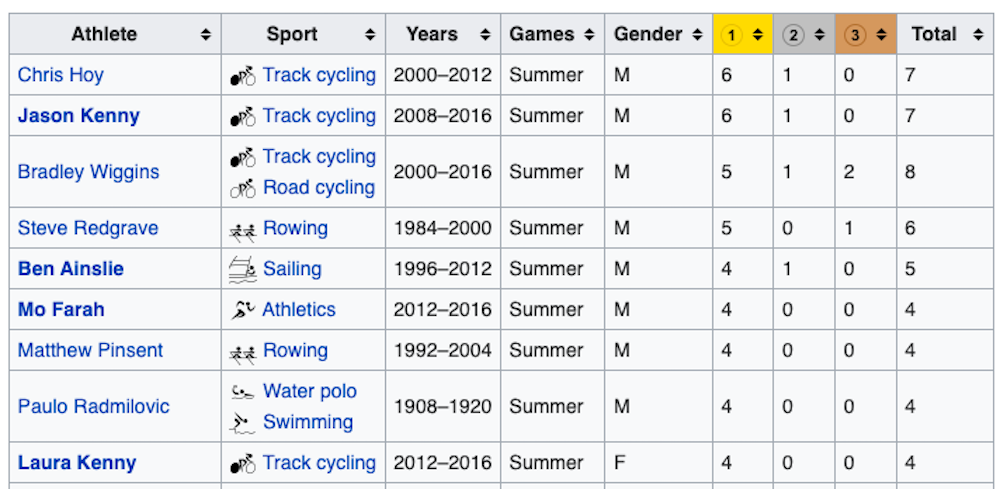The forgotten story of Wales’ greatest ever Olympian Paulo Radmilovic
David Owens
Cast your eye over the table above and you will see a host of familiar sporting greats.
This list of those British Olympians who have won the most gold medals at summer Olympic Games features a glittering array of household names.
Chris Hoy, Bradley Wiggins, Steve Redgrave, Mo Farah, have long since written their footnote in sporting history.
However, sandwiched between cyclist Laura Kenny and rower Matthew Pinsent, you’ll find a name that may not be so familiar.
Make no mistake, Paulo Radmilovic deserves his place in the list, not only as one of Great Britain’s greatest Olympians, but the distinction of being Wales’ greatest ever Olympic sportsman – a feat achieved in not one, but two events.
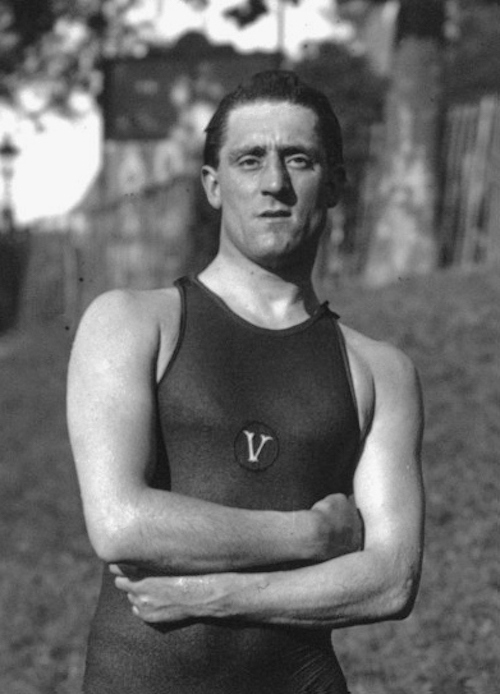
While his name might not immediately identify him as Welsh, the Cardiff aquatic enigma and four time Olympic gold medallist is more than worthy of the lofty accolade.
A world class water polo player and swimmer he had an Olympic career that spanned 20 years, making his first appearance at the London games of 1908 and his final appearance at the 1928 games in Amsterdam, at the age of 42.
Whether it was because he was born in a pub or because a canal ran in front of the particular watering hole, but it is inarguable that Paolo Radmilovic was ‘in the drink’ from an early age.
Born in the Tiger Bay area of Cardiff on March 3, 1886, his mother was from Cardiff, the daughter of Irish immigrants, while his father was Antun Radmilović, a native of Dubrovnik in Croatia, who relocated to Cardiff in 1860s and became the landlord of the Glastonbury Arms pub in Bute Street, adjacent to the Glamorganshire Canal.
The Radmilovic family were also the landlords of the Bute Dock Tavern in Bute Street in the city.
The story of Paolo Radmilovic as told by A48 Theatre Company
It’s said that ‘Raddy’, as he was nicknamed, first discovered a love for water when he went for a swim in the Glamorganshire Canal that ran alongside his home in Bute Street.
Whatever the truth, he was a natural in the water.
Making his debut for the Wales national water polo team at the age of 15 in 1901, he was at the time the youngest international player in the history of the sport.
He made his Olympic debut at the 1908 Games, winning a gold medal as part of the British water polo team that defeated Belgium 9-2 in the final, scoring twice.
Two days later he was drafted into the 4×200 metre relay final when another swimmer withdrew due to illness. Hungary appeared to be cruising to victory until their anchor leg swimmer became ill, allowing the GB team and Raddy to win gold.
At the games he also competed in three individual freestyle events, however failing to make the finals.
He won his third career gold as part of the British Water Polo team at the 1912 Summer Olympics in Stockholm, when the Austrians were comprehensively defeated 8-0 in the final.
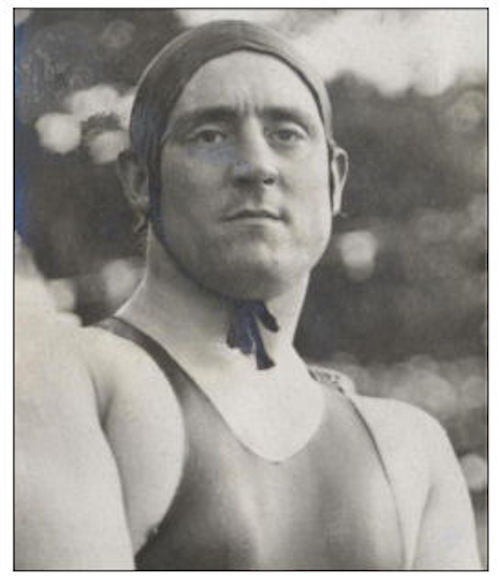
His finest moment in an outstanding Olympic water polo career came at the 1920 Olympics in Antwerp. There he int he Olympic final he scored the winning goal three minutes from time in a turbulent 3-2 victory against home side Belgium, securing his fourth and final gold
At the final whistle incensed Belgian spectators attempted to attack the British players and an armed police guard was needed as they left the pool.
Raddy was also a member of the British team in both the 1924 and 1928 Olympic water polo tournaments, although this time without medal success.
Swimming legend
He was 42 years old when his Olympic career ended. His record of four gold medals was unrivalled by any British Olympian until Sir Steve Redgrave equalled and eventually broke it by winning his fifth title in the 2000 Summer Olympics in Sydney.
Aside from the Olympics, Radmilovic competed in international swimming and water polo for nearly 30 years winning nine ASA (Amateur Swimming Association) titles.
His victories at the Welsh National Championships took place over an even greater timespan, starting with a 100 yards title at the age of 15 and ending with a 440 yards victory at the age of 43 in 1929.
Locally, rather amusingly he was remembered as ‘the Shark of the Taff’ because of his impressive performances in the Taff Swim, which was first held in 1924.
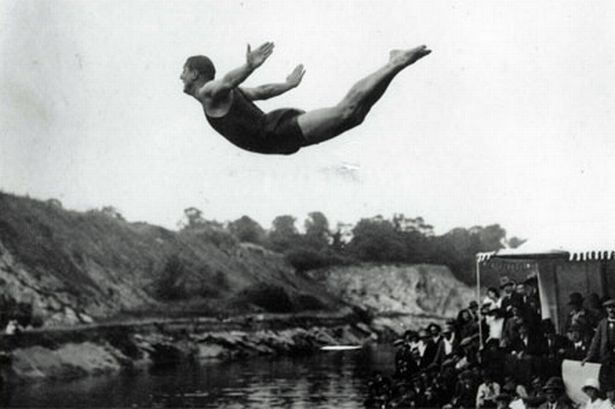
In 1967, he was inducted in the International Swimming Hall of Fame. He was the second water polo player, after American Wallace O’Connor, and the third Briton, after coach Matthew Mann and English Channel swimmer Captain Matthew Webb, to be inducted.
After his competitive sporting career he kept the family publican tradition alive by becoming the licensee of the Imperial Hotel in Weston-Super-Mare.
He was still swimming 400m a day at the age of 78.
Paulo died in Weston-Super-Mare on September 29, 1968, aged 82.
There is a Radmilovic family vault in Cathays Cemetery in Cardiff, however Raddy is buried in the Victorian Milton Road Cemetery in Weston,
His status as Wales’ greatest Olympian has yet to be emulated. In recent years those achievements have finally been posthumously recognised.
Raddy was inducted into the Welsh Sports Hall of Fame in 1999. To celebrate the one hundredth anniversary of his 1908 double-gold Olympic performance, a plaque was placed at the Cardiff International Pool in his honour, paid for by the 2012 London Olympics Committee and the Welsh Assembly.
In 2014 two statues of Raddy were unveiled at the LC leisure complex in Swansea.
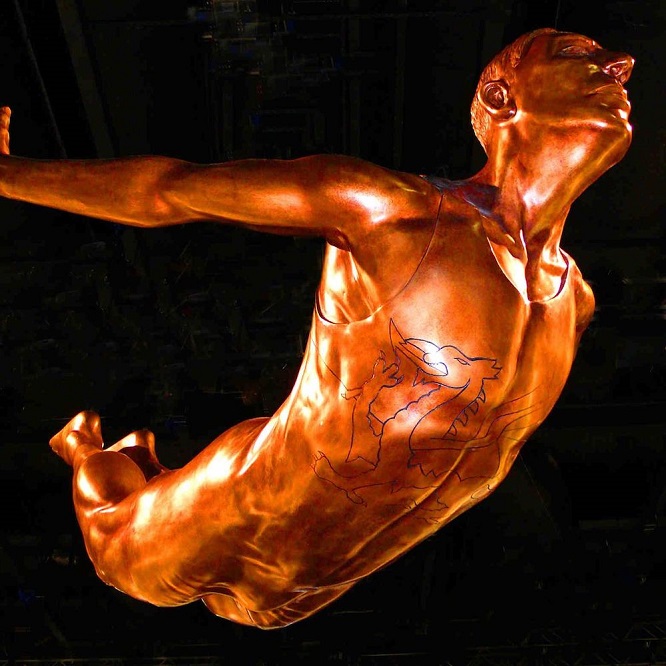
A spokeswoman for the LC said at the time: “The idea is to recognise his incredible sporting accomplishments and to resurrect the legacy of Radmilovic and remind people of his outstanding achievements in order to inspire a new generation of young athletes.
“It does not matter he was not from Swansea itself, he’s a true inspiration to Welsh athletes everywhere.”
The story of Paolo Radmilovic may not be one immediately known by the wider Welsh public, but as the Olympics in Tokyo gets underway this weekend, the Welsh Olympian’s feats have more than stood the test of time.
They were impressive then. And they are impressive now.
Support our Nation today
For the price of a cup of coffee a month you can help us create an independent, not-for-profit, national news service for the people of Wales, by the people of Wales.



